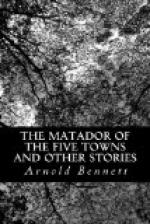The road was never quite free of houses. After occurring but sparsely for half a mile, they thickened into a village—the suburb of Bursley called Toft End. I saw a moving red light in front of us. It was the reverse of Hyatt’s bicycle lantern. The car stopped near the dark facade of the inn, of which two yellow windows gleamed. Stirling, under Myatt’s shouted guidance, backed into an obscure yard under cover. The engine ceased to throb.
“Friend of mine,” he introduced me to Myatt. “By the way, Loring, pass me my bag, will you? Mustn’t forget that.” Then he extinguished the acetylene lamps, and there was no light in the yard except the ray of the bicycle lantern which Myatt held in his hand. We groped towards the house. Strange, every step that I take in the Five Towns seems to have the genuine quality of an adventure!
VI
In five minutes I was of no account in the scheme of things at Toft End, and I began to wonder why I had come. Stirling, my sole protector, had vanished up the dark stairs of the house, following a stout, youngish woman in a white apron, who bore a candle. Jos Myatt, behind, said to me: “Happen you’d better go in there, mester,” pointing to a half-open door at the foot of the stairs. I went into a little room at the rear of the bar-parlour. A good fire burned in a small old-fashioned grate, but there was no other light. The inn was closed to customers, it being past eleven o’clock. On a bare table I perceived a candle, and ventured to put a match to it. I then saw almost exactly such a room as one would expect to find at the rear of the bar-parlour of an inn on the outskirts of an industrial town. It appeared to serve the double purpose of a living-room and of a retreat for favoured customers. The table was evidently one at which men drank. On a shelf was a row of bottles, more or less empty, bearing names famous in newspaper advertisements and in the House of Lords. The dozen chairs suggested an acute bodily discomfort such as would only be tolerated by a sitter all of whose sensory faculties were centred in his palate. On a broken chair in a corner was an insecure pile of books. A smaller table was covered with a chequered cloth on which were a few plates. Along one wall, under the window, ran a pitch-pine sofa upholstered with a stuff slightly dissimilar from that on the table. The mattress of the sofa was uneven and its surface wrinkled, and old newspapers and pieces of brown paper had been stowed away between it and the framework. The chief article of furniture was an effective walnut bookcase, the glass doors of which were curtained with red cloth. The window, wider than it was high, was also curtained with red cloth. The walls, papered in a saffron tint, bore framed advertisements and a few photographs of self-conscious persons. The ceiling was as obscure as heaven; the floor tiled, with a list rug in front of the steel fender.




